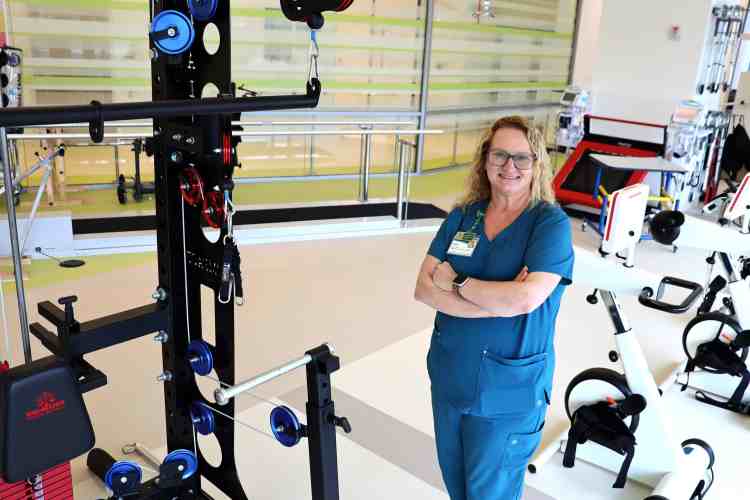Simulation strengthens rehab code response

After consecutive Code Blue events, therapists at UAB Medicine’s Spain Rehabilitation Center recognized an opportunity for some strength training of their own.
Partnering with UAB Clinical Simulation, education coordinator Denise Graham brought Code Skills Out of Lab training to her team, helping staff strengthen their skills, confidence and readiness for emergency events.
“Staff expressed discomfort with using the crash cart, communicating the code effectively and managing the AED,” she said.
Her department being approximately five minutes away from UAB Hospital’s code team, Graham knew that code skills could prove to be a life-saving asset.
“Since therapists are less frequently involved in code events than nursing staff, this presented an important opportunity to improve both patient safety and staff confidence,” she said.
Remembering that UAB Clinical Simulation offers a Code Skills Out of Lab experience, Graham knew just who to call.
Clinical Simulation’s Code Skills Out of Lab (OOL) program effectively brings the sim lab to the learners, allowing facilitators to host code skills simulations for health-care team members within their own spaces.
“Staff in some areas might be less familiar with how to respond to a Code Blue,” said Andres Viles, Clinical Simulation’s director of immersive simulation. “So, to move the needle on patients’ survival, we empower local teams to respond, meeting them where they are and helping them deliver training with their staff and team members.”
For Graham and her team, that meant simulations in therapy gyms.
“This can look very different than a Code Blue in a patient’s room or ICU,” she said. “Our patients could experience a code event while in an overhead track, a sling or the parallel bars. Practicing in their own environment allows staff to become comfortable and gain confidence in managing these types of medical emergencies.”
Code Skills OOL sessions employ Rapid Cycle Deliberate Practice (RCDP), a teaching technique that focuses on rapid acquisition of skills, wherein participants rapidly cycle between deliberate practice and directed feedback until they’ve effectively mastered the subject.
Since facilitating Code Skills OOL lab sessions over the last couple of years, Graham has noticed a discernible difference in staff confidence and coordination.
“They work much more fluidly as a team each time we conduct a simulation, communicating much more effectively and supporting one another throughout the drill,” she said.
Participants have come to recognize the importance of clear roles and teamwork, Graham added, noting that each time they finish a drill, learners comment on how helpful the experience was—and how much more comfortable they feel when responding to an actual Code Blue.
“I can’t say enough about what it has done for the confidence of the staff,” Graham said. “With recent code events in this area, staff have come to me afterward to let me know how much the drills prepared them to manage an event.”
Now, Graham and her colleagues schedule multiple Code Skills OOL simulations in inpatient rehab throughout the year. Further, Spain leadership now requires staff participation as part of its annual education.
“We plan to begin incorporating the training with our acute therapy and outpatient therapy staff,” Graham said.
She also plans to continue partnering with UAB Clinical Simulation to develop didactic content that can be complements hands-on practice.
“Partnering with UAB Clinical Simulation has been a great experience,” Graham said. “Our department never had an opportunity to practice a code event with (health-care simulation) manikins, other than during CPR certification. The hands-on practice—and being able to work through any mistakes while simulation staff monitors the event—has helped our therapy staff become more skilled and much more confident when managing code events.”
Code Skills Out of Lab opportunities are available to virtually any department within UAB Medicine, Viles added. To learn more, email simulation@uabmc.edu.
UAB Medicine’s Clinical Simulation program offers opportunities for individuals and teams across UAB Medicine and beyond to practice before they deliver care. We encourage all who provide and support patient care to “Sim First.” Together, we can put our patients’ safety first.




0 Comments